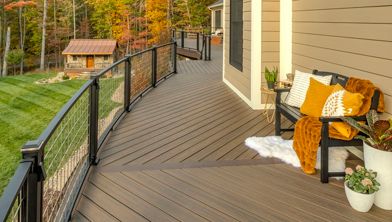- 01: Installing Trex Signature® Horizontal Deck Railings →
- 02: Installing Trex Signature Stair Panels →
Step One: Horizontal Rail Positioning
Place your pre-assembled railing panel so that baluster spacing is roughly the same on both sides. This means the space between the closest baluster and the post at either end should be equal. Eyeball this at first, then clamp your railing panel in place and take a moment to measure the spacing. Adjust as necessary before you mark your cutting point. Remember, you need a minimum of 1 ¼ inch space for the baluster to clear the bracket.
Pro Tip
You will need to use a light-coloured marker to show up on the black railing – silver works particularly well.
Step Two: Cut Your Railing Panel to Length
Secure your panel to your sawhorse using your clamp, and extend the cut mark you made earlier using your speed square as a ruler. Next, cut the top and bottom rails at both ends using a circular saw with a wood-cutting blade. Remember, the finer your blade, the cleaner the cut. Remember to put on your ear and eye protection before you cut.
Pro Tip
Adding Painter’s tape on the shoe of your saw will minimise scuffs and scratches on the surface of your railing panels.
Finally, you need to cut access holes in the anti-rattle strip at the top of your railing. This is to allow you to fasten your railing to your brackets and posts. You'll have to backtrack later if you don't cut them now.
Step Three: Set Your Panel In Place
Start this step by placing your anti-rattle adhesive strip on the top surfaces of your two bottom brackets.
Next, line the ends of your railing up with the brackets on your posts and set them into place. Once they're sitting comfortably, use the windows you cut in the anti-rattle strip to drill two holes through the rail and the bracket. Repeat at the other end. Use a 7/64 inch drill bit for this.
Next, secure the top rail to the brackets on the railings at both ends with the provided stainless steel screws. Remember to adjust your drill to a lower setting to insert the screws. Otherwise, you risk damaging the thread on your screws or the top rail and bracket.
Step Four: Installing the Top Cap, Bracket Covers, and Post Caps
The top cap – which goes over the top rail – has to be the same length as that rail. Measure it, mark it, and cut it before you set it on top of the rail, align the ends, and tap it into place with your rubber mallet. You should hear the top cap click into place, but you can test it by pulling along both edges.
Next, add your bracket covers. The top covers are flexible — just press and click them into place over the top of your bracket. The bottom bracket covers are more rigid, with a tab at the post side. Set these in place, and use a piece of wood to tap them into place as the space between balusters is too small for a mallet or much manual dexterity. Repeat for all brackets.
The post cap is even easier. Simply set it on top of your post, make sure it's aligned and level, and tap into place with your mallet.
Trex Signature stair panels are installed in a very similar way to horizontal panels. They do, however, need to be racked, the cutting can be a little more complex, and you have to install the brackets on the posts.
Step One: Racking Trex Signature Stair Panels
Racking means changing the angle of your railing panels to accommodate the angle of your stairs. This is why there are no pre-mounted brackets on stair posts — the angle determines the necessary bracket height.
To begin properly racking your stair panels, locate a piece of scrap decking. Mark and cut it to fit snugly between your posts, running along the nose of your stairs. This will be your platform for marking and will help you determine the correct bracket height.
From here, you can determine what angle your stair panels need to sit at.
Now it's time to set the panel. Place your railing section on top of your scrap decking board and adjust to work out the correct placement. Look for even spacing between the baluster and post on both ends, and make sure your balusters are running parallel with your posts.
Step Two: Clamp and Mark Your Trex Stair Panels
Clamp and mark your panels, making sure the space between the post and the closest baluster is equal on both sides. Remember to measure at a right angle to posts, not at the angle of the stairs and railing. Adjust if necessary and measure again.
Step Three: Mark Bracket Locations
When your spacing is correct, mark the location for your brackets on your posts. To do this, use a pencil to record where the bottom of the rail intersects your post. Repeat at all four meeting points of post/rail.
Step Four: Cut Your Trex Signature Stair Panel to Size
Take your stair railing over to your sawhorse to cut. Straighten the panel out before cutting so the rails are running away from you directly at 90 degrees, then clamp. Cutting at this angle will help you to avoid running into the rails as you cut.
Move each cutting mark ¼ inch in to accommodate bracket size. Transfer the mark to its new location with your speed square for accuracy. Again, use a circular saw with a fine blade to make all four cuts. Your brackets will cover the cut straight-cut edges once your Trex stair panels are fully installed.
Step Five: Install Brackets and Align Panel for Fastening
Remember, the posts on your stairs don't have brackets yet. These are key before you attach the railings to your stairs.
To install the brackets, extend the line you marked on your post in pencil and place the bottom of a bracket on top of each line. Mark the screw holes in each bracket with a pencil and remove the bracket to drill pilot holes where you have just marked. Again, use your 7/64 inch drill bit.
Next, place the brackets and use the stainless steel screws provided to attach them to your posts where the top and bottom rails of your stair panels will sit.
Step Six: Align and Fasten Your Stair Panel
The final step for installing your Trex Signature Stair Panel is racking the panel again, making sure it is at the right angle for your deck stairs and also fits into your brackets. If it doesn't fit when it is at the right angle, you might need to recut your panel or adjust the positioning of your brackets.
When racked, set the stair panel into place. Then, drill through the side of the brackets and into the rail. Finally, add your bracket covers and the stair panel top caps and post caps. Installing these is the same on a Trex stair panel as it is on Trex horizontal deck railings.
Finally, if you have scuffed or scratched your Trex railings or stair railing while assembling, you can order spray paint or a touch-up pen.
Tools:
One or two clamps
A speed square
A light-coloured marker pen (silver is recommended)
A sharpened pencil
A circular saw with a fine wood-cutting blade
Snips/shears
A measuring tape
A heavy rubber mallet
Drill
Drill bits
Optional:
Spray paint and/or a touch-up pen
Painters' tape
Thick, fingerless gloves
Materials:
Pre-installed posts (end, line, and corner)
Two-piece post covers
Screws
Adhesive strips
Top and bottom bracket covers
Pre-assembled horizontal panels
Rail brackets
Trex signature stair panels
More Resources to Explore
This content was partially or fully generated by AI and has been reviewed by our team to ensure accuracy and relevance.





































